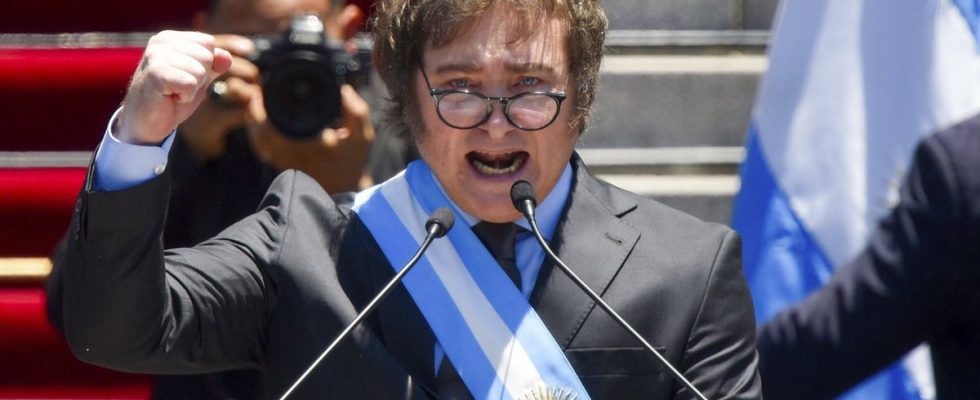His populist speeches, his outrageous responses, his radical promises… Javier Milei was elected president of Argentina after a campaign worthy of a Brazilian Jair Bolsonaro. A little over a month after coming to power, the Argentine head of state is faced with his first “test of strength”, analyzes David Copello, lecturer in political science at the Catholic Institute of Paris.
The largest union, the CGT (7 million claimed) and left-wing movements have in fact called for huge demonstrations and a national strike this Wednesday to oppose the reforms and decrees initiated by the new president. The mobilization will be closely followed. The street constitutes one of the main safeguards against Milei madness while he has already tried to implement his program of economic deconstruction in a country swept by record inflation of +211.4% in 2023.
Two major plans in progress
Two flagship projects were launched by Javier Milei who embodies a political vision of total economic liberalism coupled with social authoritarianism. It first results in the publication in December of its “mega decree” or “Decree of Necessity and Emergency” (DNU) composed of more than 300 measures which aim to reform everything and implement massive deregulation. “He has made progress on many things such as the deregulation of rent prices or even the prices of mutual insurance, in total on hundreds of measures,” explains David Copello. Barely elected, he also announced a sharp devaluation of more than 50% of the peso. Provisions which do not need validation from the Argentine parliament to come into force.
The other major part of his policy is the law called “omnibus” because it contains more than 600 articles. Unlike the decree, it is subject to a vote in parliament because “these are reforms not authorized to be implemented by decree, such as the limitation of the right to demonstrate which depends on the Penal Code”, specifies David Copello. Javier Milei does not have a majority, neither on the side of senators, nor on the side of deputies. The Argentine president must then enter into negotiations on a case-by-case basis, withdrawing one radical law to pass dozens of others.
A weak opposition from the institutions
Although he does not have a majority, the sulphurous head of state nevertheless benefits from a “friendly opposition”, a classic right “which does not want to risk opposing a newly elected government with a comfortable majority” 55.6% of the votes, underlines David Copello. An opposition “open to negotiating on all radical reforms concerning the liberalization of the market and the repression of demonstrations”, adds the specialist. “Javier Milei wanted to limit gatherings without declaration to the authorities to three people, it will ultimately be thirty people,” he illustrates.
On the other hand, the congress has, according to Frederic Tarragoni, professor of political sociology at the University of Caen and author of The Democratic Spirit of Populism (The discovery), a limited power, “a bit like the French parliament. Argentina is a presidential system. And David Copello sums it up: “The dikes are fragile”.
Where Milei faces real opposition is in the courts. Barely had his “mega decree” been published when a barrage of appeals were filed in court. So much so that the labor law body took “a precautionary measure suspending the applicability” of the provisions of the “work” chapter of its decree of December 20, pending a legislative examination on the merits. It indeed judges certain measures, such as the doubling of trial periods, unconstitutional. Justice can thus constitute a brake on the disproportionate ambitions of Javier Milei. But “it did not prevent Mauricio Macri [président argentin de 2015 à 2019] to impose a very harsh austerity policy,” nevertheless nuanced Frederic Tarragoni.
The street rampart
There remains the street. “The liveliness of civil society has been very important in Argentina for decades, it is rich in associations and mobilizations,” explains Frederic Tarragoni. It is the main antibody against a very authoritarian regime.” Indeed, observers expect a large mobilization, despite a month of January comparable to the month of August in France.
Javier Milei also confronted the infeasibility of certain measures announced during his campaign, such as the dollarization of the country or the abolition of the central bank. “Measures that are inapplicable or in contradiction with its ambitions to reduce inflation,” retorts Frederic Tarragoni.
Blowing up democracy?
The limits set by the democratic framework, by pressure from the street, “can pose a risk of authoritarian drift”, fears David Copello. “He has a very extreme agenda and a very brutal way of managing parliament, he may be tempted to circumvent the power of parliament.” “There are very worrying indicators that are unfolding,” he adds.
If Frederic Tarragoni does not believe in “a dictatorial drift”, he believes on the other hand that Milei can “transform Argentina into what was the Brazil of Bolsonaro who opened the floodgates of racism, anti-feminism, conservatism with an increased level of violence.” The mobilization and especially the level of repression will provide a good indicator for the future.

